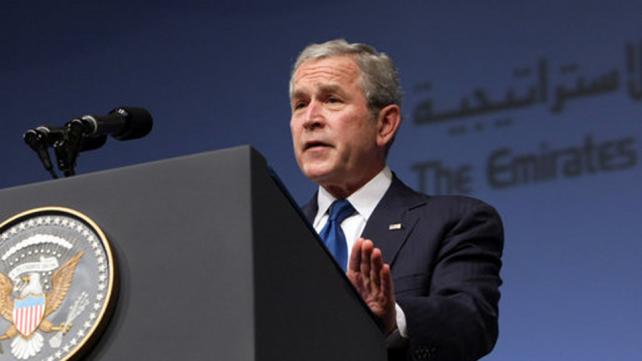
The Beginning of a Long Process
While the incredibly close and drawn out race is how most Americans will probably remember election 2000, Muslims in the US are more likely to recall this race with a sense of hope, triumph and a determination to do better next time.
If we take an arbitrary criterion of 70% or more votes as a sign of a bloc vote by a community, then three of the four distinct minorities who voted in bloc did so for Gore in election 2000. African-Americans with 90%, Jews with 80%, and gays and lesbians with 70% voted for Al Gore according to CNN exit poll statistics. There is no exit poll information available about Muslim votes.
Nevertheless, based on three unscientific surveys of Muslim voters, Muslims voted 70% to 90% in favor of Bush with a significant 34% voting for the first time. Muslims, therefore, became the only bloc vote for Bush.
In Florida, the last battleground, there would not have been any battle without an estimated 60,000 votes which Florida Muslims asserted that they delivered in favor of Bush. There are more than 200 Muslim organizations and communities in Florida. It was a surprise even for the Muslim leadership that was focussed more on other states.
However, Muslims were unable to swing the targeted state of Michigan for Bush. Michigan has the largest Arab-American population in America. This was the litmus test of their voting power which the Muslim leadership set up for themselves through their own statements. Bush, and later Gore, both responded to Muslim assertions by meeting the Arab and Muslim leadership in Michigan to swing their votes in their direction.
However, something unique happened. Michigan is union country where 43% voting households have a union member. For the first time in the history of the United Auto Workers, it negotiated a day off on Election Day, which no other American gets. They voted big in favor of Gore, thus offsetting the Muslim factor in Michigan.
Despite this noticeable loss, this is the first time in the history of the US elections that the media and politicians have both started talking about Muslim votes. Participation has started paying off for Muslims in small way even before the elections:
-It is the first time that an essentially Muslim issue was brought up during the presidential debate. Secret evidence is a civil rights issue. However, Muslims are the primary victims and they are the ones currently leading battle against the abolition of secret evidence law. Bush brought it up in the second debate on Oct. 11 in Missouri. Gore later issued a statement supporting legislation to amend the law.
-The opposition to racial profiling was considered an "African-American" issue invoked by essentially Democrats. Well, Bush became the one to not only support it but also to point out that its new victims are Arab Americans.
- It is the first time that Muslims have voted in big numbers in the US elections with 34% voting for the first time.
- Although Muslims have successfully influenced the outcome of election in some Congressional and senatorial constituencies, it is the first time that major Muslim organizations have endorsed a candidate for a bloc vote. They also demonstrated that they can deliver up to 70% of Muslim votes despite the fact that more Muslims have traditionally supported the Democratic party because of their pro-minority and pro-immigration record.
- It is also the first time that major newspapers have written articles about Muslim votes.
- There has been a Muslim congressman in the US Congress but he has chosen to keep it a secret. Now there are more than 150 Muslims who have been elected to different small offices in these elections, all keeping their Muslim names.
Despite these achievements, it is the beginning of a long process of empowerment for the Muslim community. The road is not going to be easy.
Hillary Clinton returning Muslim money
Other communities have played this game of politics for a far longer period of time. Muslims have just started learning it. For a while it will look as though we are taking two steps forward and one step backwards. One example of this involves an incident with Hillary Clinton (now Senator Clinton) returning a Muslim donation to her campaign. It cannot be treated as a freak isolated incident since there are people who are determined to keep the Muslim community in America isolated.
In 1993, I was invited to lunch by America's first lady, Hillary Rodham Clinton. A nice gesture but there was a problem - it was Ramadan. This was when I was leading the Bosnia Task Force, USA, the first Muslim alliance at the North American level.
In response, I politely declined by writing her a letter explaining why I could not attend and how Muslims fast during Ramadan. Fast forward a few years and Mrs. Clinton wasn't holding lunch at the White House for Muslims during Ramadan, but something more accommodating - Iftar. This was later followed up by Eid gatherings at the White House.
Another step forward was taken when in 1998 Mrs. Clinton declared her support for Palestinian statehood. Last year, in an American tradition of using contacts and influence, Muslims donated $50,000 to her campaign for a seat in the Senate. Since Jews make up 12 percent of the electorate in New York state, Mrs. Clinton's opponent tried to "outjew" her, to use New York Times' term, in his support of Israel by calling the donation blood money from Palestinian terrorists, forcing Mrs. Clinton to return the donation.
With more Muslim political participation, these incidents will hopefully be less frequent, although there are groups who are working to marginalize Muslims.
Interestingly enough, a second group has also used this incident by gleefully pointing out the return of donations. They are Muslims who are using it as a slap on the face of those Muslims who preach participation or in their terminology "sucking up" to the system.
All politics is local
This is not just a cliché. It is what politicians practice. President-elect Bush and Al Gore did not meet the national leadership of Muslims in Washington DC, they met Muslims and Arabs in Michigan. Now that Muslims have failed the Michigan test, the challenge is how they are going to rebuild their story. Are future politicians going to look for Muslim votes as much as Bush did?
The answer is yes if Muslims can build their electoral machine. It is the American Federation of Labor and Congress of Industrial Organizations (AFL-CIO), the National Association for the Advancement of Colored People (NAACP), and the Machine of Chicago Mayor Richard Daley that delivered votes for Democrats in the crucial cosmopolitan cities where Gore's lead came from. Muslims are also living in the same cosmopolitan areas, but without a political machine. The NAACP has done this for African-Americans and the AFL-CIO has done it for labor. The late mayor Daley built his Democratic machine fifty years ago in Chicago that is still working for his son in Chicago. How they are able to deliver votes is no secret. There are books and studies that have been done about it.
Muslims have an existing machine and at present, this is our only Muslim communication network. This is the network of Masjids and Islamic centers. The national leadership of Muslims cannot deliver votes in a long and difficult electoral process of elections every two years unless they manage to use this network in creative ways, since there are limitations on what religious organizations can and cannot do by the Internal Revenue Service (IRS).
African-American Muslims and the Immigrant leadership
African-American Muslims, by and large, went with the African American community's usual choice of the Democratic Party instead of that of the "immigrant" leadership of the four Muslim organizations who endorsed Bush. There are legitimate questions being asked regarding the process of decision making for endorsement. Was it an inclusive process? Was everyone present at the table during the selection? Who authorized them to make a decision on behalf of Muslims?
Since most national organizations of Muslims are religious, they could not endorse any candidate because of US tax laws. The organizations that announced the endorsement were relatively new and with the exception of the Council on American-Islamic Relations (CAIR), are not very well recognized at the grassroots level. The future process of decision making has to be more open for local input and inclusive of all Muslim groups.
Is it Halal to vote? Long live the ideology
There were ideological challenges to the election from within the Muslim community. Although Muslims voted in large numbers, the "to vote or not to vote" debate continued until the last minute in the Muslim community.
While a great deal of written material against voting and political participation was distributed by groups like Hizbut-Tahrir, the activists who were working for and supported voting didn't have a solid argument on paper that they could distribute at the Masjid door as the former group did. The dilemma of the silent majority turned into confusion for many community centers because of the vocal ideological minority challenging them about this "Haram" participation in the "Kufr" system of "Taghoot". Masjids were not nearly as active as Churches in voter registration campaigns.
Muslims need to know more about themselves
More non-Muslims study Muslims in America than Muslims themselves. The same might happen to the study of Muslim votes. The majority of those who voted did so for Bush. But how many Muslims did actually vote? No one knows the answer.
In almost all of the national public opinion organizations, Muslims come within two percent of respondents, which falls within a margin of error of three percent in Gallup and other surveying organizations, rendering the data from a general survey unreliable.
There is a need for focussed scientific surveys about Muslim voting behavior and demographics for a proper strategic thinking process. The Muslim leadership needs to know how many potential voters there are in each state? How many actually registered to vote? How many voted and voted for whom? How many had heard the call for a Muslim bloc vote? How many changed their mind because of that decision? How many of them contributed to politics or political parties? Are they willing to volunteer time for Muslim empowerment in the political arena?
Without this solid data, decision-making is likely to be flawed by the national leadership. If they have this data about Muslims, they can use it in a creative way that will pay for the retention of the surveying organizations' services.
Politics in non-electoral years
This Indian summer of the US election is an exception. Election season does not drag on this much. But the politics continues. Muslims need to start planning for 2002 and 2004. This involvement has to start at the primaries when candidates are free to have a lunch with you.
Muslims being a small minority also need to learn coalition politics for common causes. There has been so far only one experiment in this area.
It was during the days of the Bosnian genocide in the early 1990s, when the Bosnia Task Force, USA entered into a dialog with the National Organization of Women (NOW) and organized joint demonstrations in 100 cities across the USA against the rape of Bosnian women. Bosnia Task Force, USA was an alliance of ten Muslim organizations in America that led American Muslims to influence US policy in favor of Bosnia.
This cooperation between NOW and Muslims resulted in the women's caucus in Congress developing bills to declare rape a war crime. Bosnia Task Force, USA in this way brought the issue of the rape of Muslim women as a national issue with the help of NOW and was able to deliver good support for these bills through a grassroots campaign. This campaign not only led to the US law, but also caused the UN to deem rape as a war crime for the first time in human history.
Learning the public policy processes is another area. It is not just an academic thing. The American-Israeli Political Action Committee not only trains its own but also reportedly trains 250 American Hindus per year by placing them in different political and government offices in Washington DC, for example the White House, Senate, Congress, the State Department, Pentagon etc. This experience of how the system works is the learning ropes of politically ambitious people. That's why we need to reorganize and strengthen Muslim internship programs to the US government. Muslim interns will not only learn how policy is developed, but also how it is adopted and how the implementation process works at the national and local level. It will also help to develop contacts and relationships with the budding politicians of the future.
It was of course an intern, Bill Clinton in the era of former US president John F. Kennedy, who later became President William Jefferson Clinton.
Muslim participation beyond symbolism
The second largest donor of to President Clinton's campaign was a Muslim Pakistani-American.
Several Muslims have been contributing to political candidates for the last ten years. Iftar and Eid parties have become regular events at the White House. Muslims have given invocations to the Senate, House, and at both political party conventions. Now they have an Eid stamp issued by the US Post Office. This has been more than symbolism, but none of this has any effect on public policy.
What is happening now is real. Whether Muslims are prepared or not, by casting a bloc vote they have set themselves up for a higher level of participation in the American society. Muslims must develop resources to meet this new threshold of success. Otherwise the bloc vote may backfire by those against whom it was used.
Dr. Agha Saeed, the founder of the American Muslim Alliance has emerged as a new type of national leader of Muslims in America. He heads the Coordinating Council of the four Muslim-American political organizations: CAIR, the American Muslim Alliance (AMA), the American Muslim Council (AMC) and the Muslim Political Action Committee (MPAC). Muslims, as well as the politicians of the country, will be watching them.
American politics is a new uncharted territory for the Muslim leadership in America. May Allah guide them and grant them wisdom to remain steadfast in their intentions so they do not let their personal gain become higher than the gain for all human beings. I pray that they do not let the Muslim community's interests force them to stand against the truth and justice. May Allah save them from the corruption of this process.
An abridged version of this article has appeared in Impact December 2000 issue.
Photo Attribution: http://commons.wikimedia.org/wiki/File:George_Bush_speech_-_January_13_2008.jpg

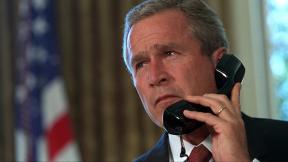
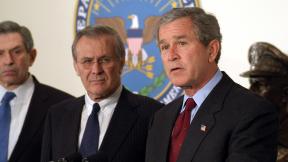
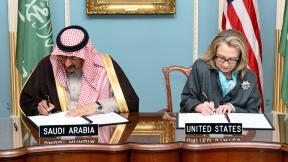

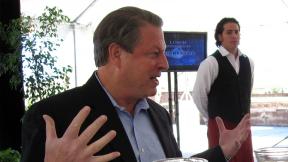


Add new comment